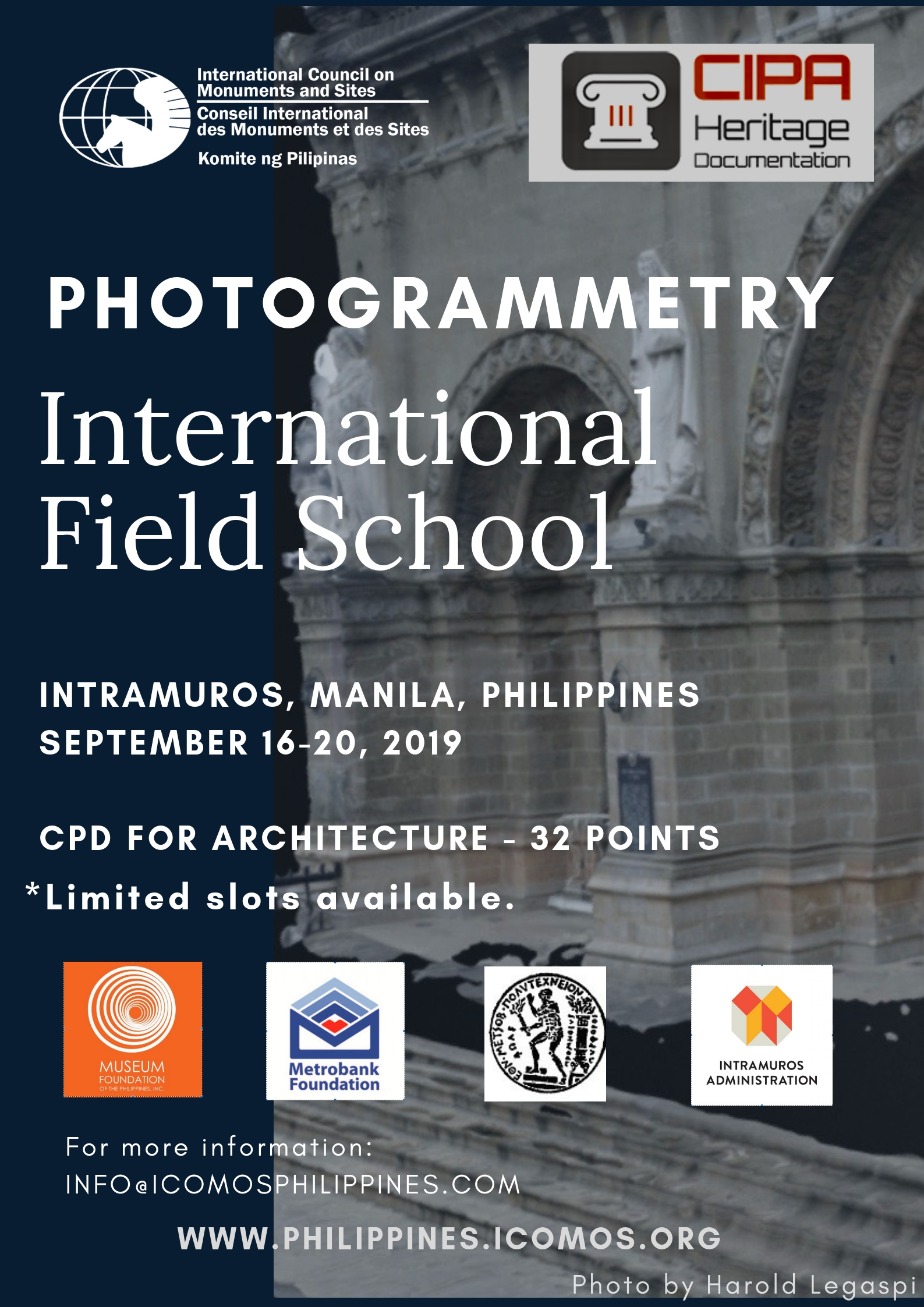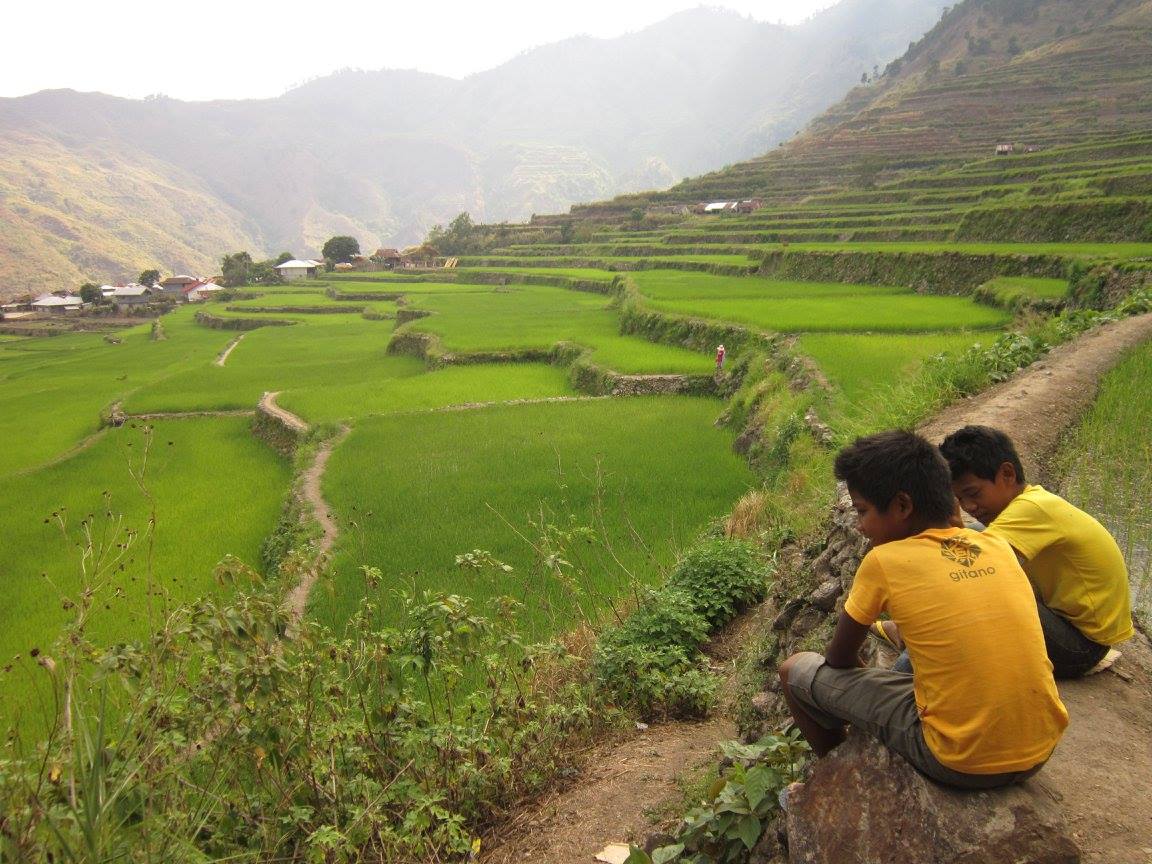
SEPTEMBER 16-20, 2019
This 5-day course capacitates heritage practitioners, students, museums workers, archaeologists and planners with photogrammetric documentation skills that meet international standards. Photogrammetry, the science of creating three-dimensional measurements from photographs, needs only the basic tools of a camera and computer. It can even be done with a smartphone, and can run on free software. Students need only a basic working knowledge in photography or documentation for this course. The program software used is COLMAP. https://colmap.github.io/
Photogrammetry’s output can be large, conducted by drone for towns, or objects, with an output that can be more accurate than that of a laser scan.
The field school will be run by CIPA (Comite International de la Photogrametrie Architecturale / International Committee of Architectural Photogrammetry), a scientific committee of ICOMOS, which promotes measurement sciences in heritage documentation. Established in 1968, CIPA has 50 years of collective experience from an international network of experts in the fields of technology and heritage. CIPA leads international training programs for conservation, advises government bodies, non-profit groups and institutions on tools, technology and methods for recording, documentation, and information management of cultural heritage.
Useful links:
https://lab.sciencemuseum.org.uk/3d-object-scans-as-a-museum-learning-resource-part-1-9e1e51b67581
http://giscan.com/en/3d-model-from-drone-data/
http://culturalheritageimaging.org/Technologies/Photogrammetry/
https://www.woodworkingnetwork.com/video/rendering-3d-protrait-log-using-photogrammetry
FACILITATORS
Prof. Andreas Georgopoulos, CIPA President, Executive Board, CIPA / Laboratory of Photogrammetry, School of Rural & Surveying Engineering, National Technical University of Athens
Margarita Skamantzari / Laboratory of Photogrammetry, School of Rural & Surveying Engineering, National Technical University of Athens
Additionally, there will be local facilitators who will be pre-trained by the facilitators to better the teacher-student ratio.
APPLICATIONS OF PHOTOGRAMMETRY
Photogrammetry has a wide use in heritage preservation, and is increasingly applied in archaeology, and conservation of objects and sites. Site managers and other stakeholders with little technical skill beyond basic photography are welcome. Used primarily as a tool to document and measure, photogrammetry can also be used as a diagnostic and evaluation tool. Photogrammetry can be used to gain a clearer view of the object or site, monitor its rate of deterioration, and evaluate effects after treatments.
photogrammetry in the philippine setting
This photogrammetry field school fills in the gap in the shortage of trained documentation professionals in the Philippines. Generally, a significant portion of a restoration project’s budget is spent on documentation, if using professionals from Manila, and if a laser scan is involved. Photogrammetry can empower local community members to begin the process of the restoration. The data can then be sent to relevant government agencies and professionals for review.
photogrammetry vs laser scanning
Photogrammetry is an inexpensive alternative to the costly 3D laser scanning. If executed properly, photogrammetry can yield the same precision as a laser scan, and its accuracy can surpass that of a laser when documenting museum objects.
program
| Day/Time | Event |
| Day 1 | Registration |
| 9:00 AM – 10:40 |
Introduction to Digital Geometric Documentation, Techniques, Applications and Limitations Introduction to Photogrammetry,Digitally Rectified Photography & Photo-mosaics |
| 10:40-11:00 | Coffee break |
| 11:00-12:00 | Ortho-photography
Terrestrial Laser Scanning – Point Clouds – 3D models |
| 12:00-1:00 | Lunch |
| 1:00 – 2:00 PM |
Introduction to Field School Program and Outputs Introduction to Digital Photography |
| 300-3:20- | Coffee break |
| 3:20 – 5:00 PM | Tutorial of Software (Image-based modelling: processing images, rectification) |
| 5:00-5:30 | Distribution of field sites |
| Day 2
8:00AM– 5:00PM |
Field Work: Participants work on selected sites in Intramuros to acquire data |
| Day 3
8:00AM– 12:00PM |
Class work: Review of raw data by professors; data processing |
| 12:00-1:00 | Lunch |
| 1:00- 5:00 | Class work: Review of raw data by professors; data processing |
|
Day 4 8:00AM– 5:00PM |
Class work: Data Processing |
| 12:00-1:00 | Lunch |
| 1:00-5:00 | Class work: Data Processing |
| Day 5
8:00AM– 12:00PM |
Class work: Preparation of Final Results and Presentation by Participants |
| 12:00-1:00 | Lunch |
| 1:00-5:00 | Class work: Preparation of Final Results and Presentation by Participants |
| 6:30 pm | Graduation dinner |
registration
To signal your interest, please send CV to info@icomosphilippines.com. Slots are very limited.
Early program registration for full week is USD$ 400.00 or PhP 20,000.00, extended until August 15 2019. You may secure your slot by depositing 25% downpayment (PhP5,000).
Registration after August 15 is USD$ 500.00 or 25,000.00.
The fees exclude transport and lodging. Fees include a welcome and final dinner.
scholarships
Generous grants from the Museum Foundation of the Philippines, Inc. and Metrobank Foundation have enabled ICOMOS to offer fifteen (15) scholarships that cover tuition, accommodation and, should the student come from outside Metro Manila, partial travel. The strongest applicant is one who can demonstrate past work in the service of heritage preservation, and the capacity to put skills to local use.
Applicants should email programs@icomosphilippines.com with a CV and a letter of intent describing how this technology will be used in the service of heritage preservation, whether for urban planning, museum work, landscape and architectural heritage preservation. Scholars will recieve an application form.
Preference will be given to local stakeholders, those whose past work have assisted local communities in documenting their heritage, or those who can provide a sustainable paid service in parts of the country where such service is absent. A panel will review the application and respond within 10 working days.
Scholarships for Filipino citizens only.

